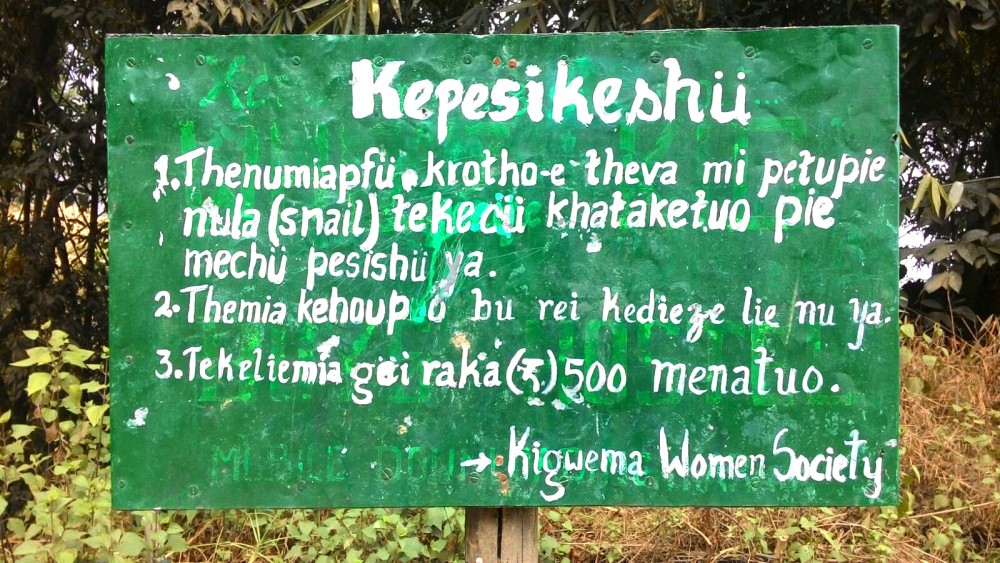Notice board at Kigwema village put up by KWS discouraging fishing with lights at nighttime.

Morung Express News
Kohima | January 17
At Kigwema, one of the oldest villages in Kohima, womenfolk are the guiding force towards environment conservation. This village, tucked away some 15 kilometers away from the State capital and surrounded by pristine and idyllic terrace fields, is not new to various environmental degradation such as stone quarries, deforestation, rampant hunting in recent years.
The Kigwema Women Society (KWS), an unsung yet commanding organization from the village, is managed by the womenfolk. The unassuming members, most of them uneducated, are engaged in farming as their source of livelihood. A beacon of hope- KWS is literally bringing the village environment and it’s men-folk to a healthy transformation.
When alcoholism became a major concern among the men folks from the village, the KWS took stock of the situation and put ban on the sale of alcohol.
In 2015, the KWS banned fishing/trapping of aquatic wildlife such as snails, frogs, and fishes during nighttime in the village jurisdiction. These aquatic species are a delicacy in the village and the practice had gone to extreme when locals as well as outsiders started fishing even at nighttime.
Generally, the breeding phenomenon of aquatic wildlife occurs at night and rampant fishing/trapping had led to a drastic decrease of its population,” KWS chairperson Nebano Bio informed.
Besides being a delicacy, consumption of wildlife are also believed to have medicinal components for numerous illnesses. “Villagers started complaining about the shortage. Many would go to the water bodies to fish for sick people only to find it empty,” said Votsono Zütso, secretary to KWS.
Following the ban, notice boards discouraging fishing of aquatic species at night time were also put up in and around the village. Today, KWS takes pride in receiving little words of gratitude from the villagers that aquatic wildlife species are spawning after their intervention.
This women society was also the only voice from the village to protest against the Dzükou bulk water supply project- which was a venture by State Investment Program Management and Implementation Unit (SIPMIU) and funded by Asian Development Bank (ADB). The project intended to channel water for Kohima town from Dzükou valley.
The project, had it materialized, would have drilled a tunnel at Mt. Japfü and cause major environmental disaster. In February 2015, KWS issued a notice to the Village Council and the Students’ Union informing that they will not allow the project.
Fortunately, the project was scraped. “To destroy the natural beauty that God has given us, it angers us,” Nebano commented.
At present, the women are worried about the water shortage farmers from Kigwema village face in their agricultural lands which has affected crop production.
Growth of vegetables such as garlic, potatoes has also been affected, said members of KWS. They maintained that water shortage is mostly because of the increase in stone quarries in the village. “We are concerned but these businesses are practiced on private lands,” Votsono pointed out while voicing their inability to stop such practices.
“We hope to put in more efforts to stop such practices that affect nature and humans. We are also open to suggestions and guidance,” she said.
And like most women in the patriarchal Naga society, the KWS initiates their little revolutions without any credit or appreciation.






